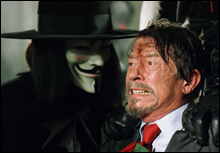 Maybe all oppression runs pretty much the same course, but Alan Moore & David Lloyd’s 1981 graphic novel V for Vendetta sure seems prescient today. They didn’t get the exact circumstances right, but the methodology of their right-wing takeover of England rings all too true. Induce a state of sourceless, endless fear and folks will kiss your hand when you take away their civil liberties for the illusion of security. By the time they realize they’ve surrendered their souls, it’s too late.
Maybe all oppression runs pretty much the same course, but Alan Moore & David Lloyd’s 1981 graphic novel V for Vendetta sure seems prescient today. They didn’t get the exact circumstances right, but the methodology of their right-wing takeover of England rings all too true. Induce a state of sourceless, endless fear and folks will kiss your hand when you take away their civil liberties for the illusion of security. By the time they realize they’ve surrendered their souls, it’s too late.
Moore and Lloyd posed this paradigm in a Cold War era and it never came to pass. Leave it to the Wachowski Brothers to update it for the War on Terror, or rather its aftermath. It’s the year 2020, and a fascist party rules over England, the only country to have emerged intact from a vague worldwide conflagration sparked by America’s Iraq-like adventurism. Various flashbacks and “news” broadcasts piece together this back story, which includes 9/11-like terrorist attacks and conspiracies and sounds more relevant and interesting than the actual movie.
Be that as it may, England has prevailed as a neo-1984 entity headed by the ubiquitously telecast if untelegenic Chancellor Sutler (John Hurt, who played the protagonist in the movie version of Orwell’s classic). With its system of total surveillance and police-state tactics, the government seems omnipotent. Until, that is, Batman, er, Zorro, or rather V (Hugo Weaving), makes his explosive appearance. He’s a superhero armed with daggers and quote-laden diatribes against tyranny and clad in the mask and cape of Guy Fawkes, doomed agent of the 1605 plot to blow up Parliament.
Sound familiar? Not really. Does anyone remember the Fifth of November, even in England? And that grinning Guy Fawkes mask, both vapid and hideous, won’t stir in American film fans anything except uneasiness.
Natalie Portman is a different story. As Evey (the “v” alliteration gets tiring), she provides the film with a genuine heroine, a dynamic character forged into steel. A gopher at the government-run TV station, she’s rescued from police “fingermen” by V and under his tutelage endures a winnowing transformation from frightened, willfully ignorant sheep into existentially purged crusader for freedom. Or perhaps anarchy. Or maybe just the kind of independence or self-assertion you’d find in a Disney animated movie.
Fortunately, whenever Evey or the audience drifts from the message, the Wachowskis provide V with a wry and witty homily; delivered by Weaving, these are affecting if overlong. And first-time director James McTeigue has a knack for claustrophobic atmosphere, exhilarating Matrix-like action, and eloquent visual metaphors ranging from exploding landmarks to falling dominoes. The pyrotechnics underline the film’s call for awareness and resistance, its intent to shape its audience into freedom fighters like Evey. But fighting what? And to what end? These vagaries turn what could have been the most subversive movie in a long time into something confused, diverting, and strange.